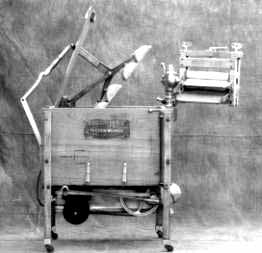TSgt. Allan #2
Letter #2 "Aussi Races & Trains."
Note: Pictures added for clarity. Pictures are not necessarily originals from TSgt. Allan.
The Australian people in 1942, mostly of British blood, worked hard,
played hard, and took their fun very seriously. An Aussie once told me,
while discussing the differences between our two peoples, that the Aussie
man didn't know the meaning of the word "no." The men, though,
would do anything for another soldier, especially the Yanks. They would
give them the shirt off their back. They lived as decently as the war
would let them. However, their mode of society, (for want of a better
expression) was fifty years behind our way of living. There were so man y
old items, and ways of doing things. I saw a magazine advertisement about
the absolute, newest, best, and efficient modern laundry equipment. The
picture showed an old wooden tub washing machine, with the wood handle
sticking up on the side that you worked back and forth to make the inner
tub swish back and forth. I thought it was amazing. We had one like it
back home in the early twenties. I could hardly believe it, and it was
a newly printed magazine! (Note: The picture of the tub on the
right is similar to the one descibed by TSgt. Allan. Picture courtesy
of Lee Maxwell's Antique Washing Machines.
y
old items, and ways of doing things. I saw a magazine advertisement about
the absolute, newest, best, and efficient modern laundry equipment. The
picture showed an old wooden tub washing machine, with the wood handle
sticking up on the side that you worked back and forth to make the inner
tub swish back and forth. I thought it was amazing. We had one like it
back home in the early twenties. I could hardly believe it, and it was
a newly printed magazine! (Note: The picture of the tub on the
right is similar to the one descibed by TSgt. Allan. Picture courtesy
of Lee Maxwell's Antique Washing Machines.
They tell people when traveling anywhere in the world, "Don't drink the water." So on our first trip to town, beer was obviously the appropriate replacement. We entered a pub and put in our order for a large stein of froth. After the first large gulp, we held the beer in our mouth -- not being able to swallow any of it. "God Save the King" it was almost hot! I don't think we ever got used to it, nor did the Aussies ever learn to serve beer cold to the yanks.
In the summer, house windows were wide open. During the worst periods, every couple hours we were all chased out of the house, the windows closed and a bug bomb set off. When re-entering was possible, and the flies and mosquitoes temporarily dealt with, people would raise windows again and be sans bugs for another couple of hours. Then, the same thing started all over again. I vowed that if I lived through the war, I would do my damnedest to return and start making window and door screens for a whole nation – and make millions! Eight or ten years later, my cousin visited Australia. When he returned, he told me that the bug bomb routine continued. I almost sat down and cried. Some old customs never die.
The quaint little towns in the "near" Outback, were usually very quiet but, at certain times of the year, the population swelled by thousands. I don't know where all the people came from, or where they all stayed. The small hotels, one or two stories, accommodated a very few. The race season was on! There were horse races every day for a week. Once I went alone to a small place. Why? I don't remember. Nor do I remember why I went alone. On a weekend pass during the night, I suddenly had a violent urge to get to the bathroom. The clerk already told me that, just in case, the "loo" was in the corner! I ran around all over both floors trying to find the corner room. I was getting frantic and didn't know what to do. Finally, I saw a man walking down the hall. I told him I couldn't find the toilet room. Oh, he says, "you are looking in the wrong place. It's out side in the far corner of the lot!" I took off on the run. I think I had both thumbs "plugging the breech." It was dark, and with no lights, but I made it. Thank God for a four holer! It didn't really register until next morning but there was no modern indoor plumbing at all! To wash your face, shave, or sponge bath, there sitting on a commode was a large bowl and a pitcher of water. I never thought I would see the day that I'd have to wash my face as great grandmother did. All in all, it was a good weekend. I'm just glad the races were not on! Almost every burg had a race track. A somewhat larger town had seven. The betting was furious on race day.
There was not much in the way of a railway system. Oh yes, there were many small side tracks going off in all directions, but they were all of different gauges. On the leg from Canberra to Sydney, we had to change all our freight from one open car to another car on another set of tracks. The cars, then, were the size of our twenty ton gravel truck boxes. That got old pretty quick!
There was only one main railroad line across the whole country. However,
it was a very modern streamliner, just as we knew them at home in 1940.
This was the only truly modern thing I remember seeing during our stay.
It took seven days to traverse the three thousand or so miles across the
southern part of the land. It took six or seven days for the return trip
to Sydney. The train had to stop at every little "whip-stich"
(the small villages out in the desert.) That was their only way (war time,
I guess) to get staples and the other necessities of life delivered! I
saw one man come to the freight car for his s ix-pack
of beer. Evidently, this was the only thing he had on order this trip.
ix-pack
of beer. Evidently, this was the only thing he had on order this trip.
On this line, there is the longest, straightest set of tracks in the world, about four hundred miles, I think, straight as a stretched string. In the outback, there is a national law: "No one can refuse to give a stranger lodging for the night." There are too many dangers for a person to be in the open, what with the desert, man-eating Komodo Dragons (they tell me), umpteen kinds of poisonous snakes, crocodiles, Dingos (wild dogs), and who knows what else!
Send Corrections, additions, and input to:

Visitors since
June 6, 2000
|
Visitors since
June 6, 2000 |